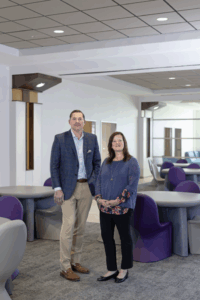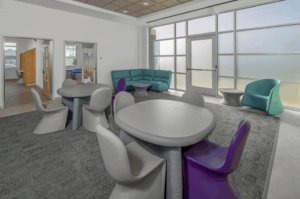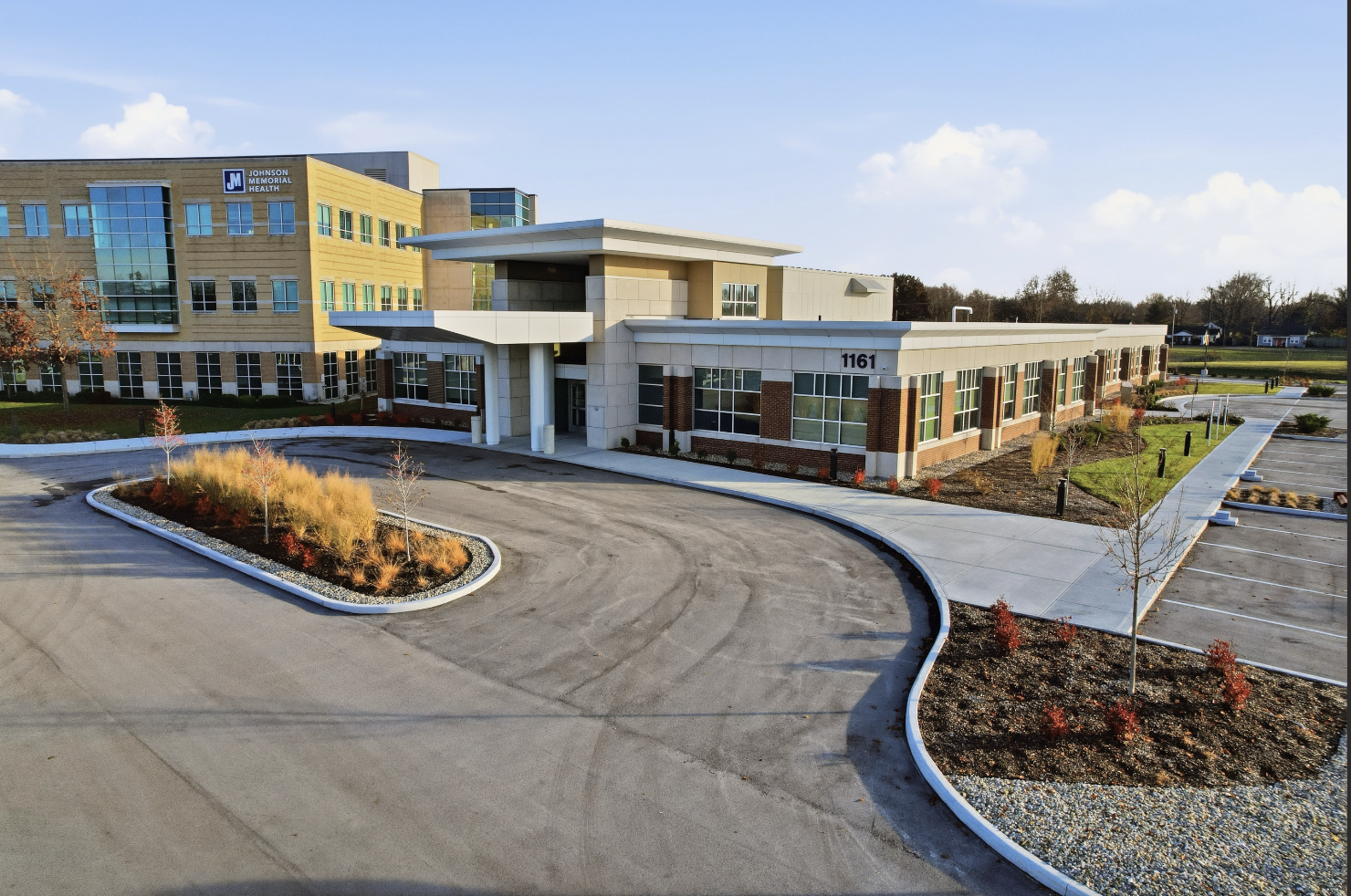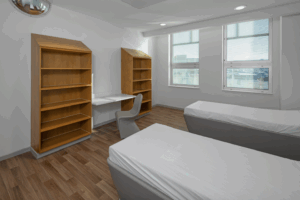Johnson Memorial Health to Open New Behavioral Health Center
 When Dr. David Dunkle walks through the new Behavioral Health Center on the Johnson Memorial Health (JMH) campus, he sees far more than a modern addition to the hospital’s west wing. He sees hope. He sees years of community collaboration realized in the form of 29 inpatient beds and a compassionate care model designed to meet one of Johnson County’s most urgent needs — accessible, local mental health treatment.
When Dr. David Dunkle walks through the new Behavioral Health Center on the Johnson Memorial Health (JMH) campus, he sees far more than a modern addition to the hospital’s west wing. He sees hope. He sees years of community collaboration realized in the form of 29 inpatient beds and a compassionate care model designed to meet one of Johnson County’s most urgent needs — accessible, local mental health treatment.
“This project represents our community at its best,” Dr. Dunkle, JMH’s president and CEO, says. “It’s the result of leaders across the county coming together — commissioners, council members, law enforcement, the health department and others — to address a growing problem. We knew we didn’t have enough inpatient behavioral health beds, and that too many of our residents were being sent to facilities hours away. Now, we can offer that care right here at home.”
A Community Responds to a Growing Crisis
In recent years, behavioral health challenges have become increasingly prevalent across the nation and close to home.
Johnson County, like so many communities, faced a shortage of inpatient beds for residents in crisis. Many found themselves waiting in emergency departments for placement or being transported to facilities as far away as Terre Haute. Others ended up in the county jail — an outcome no one wanted but often deemed the safest temporary solution.
Recognizing the urgency, a coalition of local stakeholders began meeting over two years ago to discuss the crisis and identify solutions. Their conversations laid the foundation for what would become the JMH Behavioral Health Center. The project ultimately came to fruition with support from the Johnson County Commissioners and County Council, who appropriated American Rescue Plan Act (ARPA) funds to construct the new facility.
 “It’s an amazing example of what can happen when local government and healthcare organizations work together,” Dunkle says. “This was a true partnership built on the shared goal of helping residents in need.”
“It’s an amazing example of what can happen when local government and healthcare organizations work together,” Dunkle says. “This was a true partnership built on the shared goal of helping residents in need.”
Healing the Whole Person
The Behavioral Health Center marks a major step forward for JMH in its mission to provide quality healthcare services for the whole person — body and mind.
“Behavioral health is of equal importance to physical health,” Dunkle explains. “For years, we’ve been recognized for high-quality, safe medical care. Now, we’re extending that same level of excellence and compassion to behavioral health. We want every patient who walks through our doors to feel supported, respected and understood.”
The center’s creation aligns with a philosophy that health care should treat the entire human experience.
“This new unit allows us to integrate total body healing,” Dunkle says. “No longer are we limited to treating acute physical problems. Now we can treat acute behavioral health issues as well.”
The 29-bed inpatient unit represents the latest milestone in a decade-long journey. Dunkle recalls that more than a decade ago, the hospital foundation identified behavioral health access as the community’s greatest unmet health care need. That insight spurred years of effort — beginning with the establishment of the annual JMH Foundation Gala, which raised funds for behavioral health initiatives. The hospital then hired a community health navigator to help connect patients to available services and expanded access to behavioral health therapy. The new inpatient unit, Dunkle says, is “simply amazing to see come to life.”
“But our work isn’t done,” he adds. “There will always be people in need, and we are committed to helping as many as we can — now and in the future.”
The Patient Comes First
For Dr. Heidi Monroe, DBH, the newly appointed program director of the JMH Behavioral Health Center, the vision is clear: every patient deserves compassion, dignity and individualized care.
“Just like Johnson Memorial Hospital, the Behavioral Health Unit is a patient-first unit,” Monroe says. “Our goal is to help each person heal through their mental health journey. Every individual in crisis deserves compassionate and caring treatment focused on enhancing their life and easing the pain brought on by acute mental health challenges.”
Patients admitted to the unit will receive between 30 and 35 hours of structured care each week. The program combines evidence-based therapeutic practices with holistic wellness activities designed to promote long-term balance and stability. Treatment includes processing and educational groups, medication management and creative and recreational therapies such as art, mindfulness, yoga and self-care workshops.
“We provide daily medication management and follow-up to ensure each patient’s regimen is right for them,” Monroe explains. “Our goal is not just to stabilize, but to empower — to help patients find tools that support ongoing wellness and reduce the likelihood of future crises.”
A Partnership for Healing
A key feature of the Behavioral Health Center’s approach is collaboration — both within JMH and throughout the wider network of community care.
“Collaboration with other departments is key,” Monroe says. “Patients in crisis often have other unmet medical needs. By working closely with our colleagues throughout JMH, we can meet the patient where they are — addressing their physical, emotional and psychological needs together. That’s how we help patients return to their lives stronger and more functional than before.”
This integrated care model also extends to discharge planning. Upon admission, patients participate in designing their personalized treatment plans, including goals for after their hospital stay. The Behavioral Health team works directly with community agencies to arrange follow-up appointments and ensure each patient leaves with a network of ongoing support.
“We start planning for discharge from the moment a patient arrives,” Monroe says. “That collaborative process helps bridge the gap between hospital care and home life. It’s about giving patients the tools and support they need to continue healing safely in their own environments.”
Designed for Calm and Comfort
Step inside the Behavioral Health Center, and it’s clear that the design itself is part of the therapy. Natural light fills the hallways and community spaces. The color palette is soft and serene, evoking peace rather than sterility. Artwork depicting tranquil natural scenes lines the walls, encouraging mindfulness and reflection.
“The design and environment were curated specifically to be healing,” Monroe says. “We wanted a space that feels calm and safe — a place where patients can breathe. Every detail, from the light to the artwork, was chosen to promote comfort and peace of mind.”
The goal is to remove the sense of confinement or clinical coldness that some associate with inpatient behavioral units.
“Our patients deserve a space that feels dignified,” Monroe adds. “Healing is not just medical — it’s emotional and environmental too.”
Redefining the Conversation Around Mental Health
Both Dunkle and Monroe emphasize that the new center is not just a facility — it’s a statement of values. It signals to the community that mental health is deserving of the same investment, attention and compassion as any physical ailment.
“The more we talk about behavioral health — the more we build the buildings and create the programming — the more we help people understand that mental health issues are extremely prevalent,” Dunkle says. “No one should feel ashamed or guilty for experiencing a behavioral health crisis.”
Monroe echoes that sentiment, noting that one of the center’s goals is to challenge misconceptions about mental illness and the people who experience it.
“Unfortunately, stigma still exists,” she says. “But every one of us may face a mental health challenge at some point in our lives. By opening this unit, we’re not only treating people — we’re helping the community learn, understand and respond with compassion.”
That education has already begun. The JMH Behavioral Health team is partnering with local organizations — including EMS and fire departments — to provide training and resources around emotional trauma and crisis response.
“We want to be a resource for the entire community,” Monroe says. “Healing doesn’t end at our doors.”
Measuring Success Through Lives Changed
When asked how success will be measured, Dunkle’s answer is simple: by the lives touched.
“Success is having those in need admitted to this unit,” he says. “It’s knowing that our community members can now receive high-quality mental health care from the same organization they trust for their physical health needs.”
For Monroe and her team, success also means seeing patients leave the unit stronger, more connected and more hopeful than when they arrived.
“Healing looks different for everyone,” she says. “But if a patient leaves here believing in the possibility of wellness again, that’s success.”
 A Vision for the Future
A Vision for the Future
Looking ahead, both leaders share an optimistic vision of what this center will mean for Johnson County in the years to come.
“In five years I hope people will think of Johnson County as a place that truly embraces positive mental health and wellness,” Monroe says. “I hope they’ll see this center as a place of healing, hope and wholeness.”
Dunkle agrees, emphasizing the center’s role as part of JMH’s long-term commitment to community well-being.
“This is a major step forward, but it’s also part of a continuum,” he says. “We’re not just addressing a crisis — we’re building a future where behavioral health is understood, supported and accessible to all.”
As he reflects on the journey from early brainstorming sessions to the completed facility, Dunkle can’t help but feel proud of what the community has accomplished together.
“To see our efforts leading to this new 29-bed unit is simply amazing,” he says. “It’s proof of what’s possible when people come together for the greater good. And it’s a reminder that our work — our mission to care for this community — never stops.”



 A Vision for the Future
A Vision for the Future
